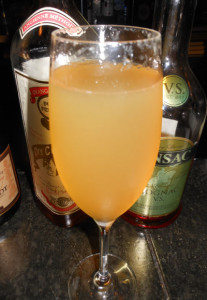Recipe of the Day
Testimonials
A major new study has found that children who were overweight in kindergarten were much more likely to be obese by eighth grade. And almost every child who was very obese remained that way. The study tracked the body weight of more than 7,000 children and its results surprised many experts.
Although some obese or overweight kindergartners lost their excess weight, a child’s chance to avoid obesity diminished each year that passed. By age 11, children who were obese or overweight stayed that way. To combat the nation’s obesity epidemic, experts suggest that efforts must start much earlier and focus more on the children at greatest risk.
Replacing soda and soft drinks in whole or in part with Syfo Beverages is a perfect and delicious way to get your kids off to a healthy start. Syfo Original Seltzer and Syfo Tangerine-Orange, Lemon-Lime and Wild Cherry Naturally-Flavored Sparkling Waters are calorie-free and contain no sugar, sodium, high fructose corn syrup, artificial sweeteners, preservatives or caffeine. Plus they taste great. Serving your children Syfo will steer them away from sugary soda — a major factor in childhood weight gain.
You can read more about the study in this New York Times article.
As reported on the Healthday.com website, recent MRI studies conducted by German researchers indicate that energy drinks create additional strain on the heart by causing it contract more rapidly than usual. The study raises concerns that energy drinks might be bad for the heart, particularly for people who already have heart disease.
According to the study, healthy people who drank energy drinks high in caffeine and taurine experienced significantly increased heart contraction rates an hour later. Taurine is an amino acid that plays a number of key roles in the body and is believed to enhance athletic performance. Caffeine is the natural stimulant that gives coffee its kick.
The participants were given an energy drink contained 400 milligrams of taurine and 32 milligrams of caffeine per 100 milliliters of liquid (about 3.4 ounces). The 18 healthy participants were given magnetic resonance imaging (MRI) scans to measure their heart function before and one hour after they consumed an energy drink. Participants experienced a 6 percent increase in their heart contraction after downing the energy drink.
The study’s authors expressed concern that the energy drinks could potentially lead to adverse cardiovascular effects such as irregular heartbeat. From 2007 to 2011, the number of emergency room visits related to energy drinks nearly doubled in the United States, rising from slightly more than 10,000 to nearly 21,000 according to a news release from the study’s presentation meeting. Most of the cases involved young adults aged 18 to 25, followed by people aged 26 to 39.
Results of this study are considered preliminary until it is peer-reviewed. To learn more about the study, visit the Healthday.com website.
Everyone at Syfo Beverages would like to wish you a happy and healthy Hanukkah. For years now, Syfo has been a part of traditional family gatherings during this joyous time and throughout the year.
That’s because Syfo Original Seltzer and Naturally-Flavored Sparkling Waters are certified Kosher, not just for Hanukkah, but all year round. Jewish families across the Southeast know they can depend on Syfo for refreshing, healthy beverages that are available for any occasion.
In a recent New York Times article, Michael C. Bellas, chief executive of the Beverage Marketing Corporation, was quoted as saying that the sale of bottled water, including sparkling water, is expected to surpass the sale of soda by the end of the decade if not sooner.
To many this is a startling development as soft drinks giants the Coca-Cola Company and PepsiCo have dominated the beverage market in this country for most of the last century. But the move toward water has been a trend that’s been growing since the 1980s and Bellas noted that sales of bottled water grew at a rate of 20 percent in every quarter from 1993 to 2005. Part of what is driving the trend are health concerns, as some data points to a growing correlation between obesity, diabetes, heart disease and other health issues with the consumption of sugary soft drinks. Public health officials have also encouraged greater consumption of beverages with less sugar.
As the plain bottled-water market matures, sparkling waters are growing fast in market share and popularity. In the same New York Times article, Talking Rain Beverage Company’s chief executive Kevin Klock says: “There’s a large market out there that wants something sparkling, something flavored, something without a controversial sweetener…”
Syfo Beverages Naturally-Flavored Sparkling Waters are a great choice if you want to turn to healthier beverages. Free of sugar, sodium, artificial sweeteners or preservatives, they’re made with 100% purified water.
To read the entire New York Times article, click here.
Many people who want to stay healthy and hydrated have turned to sparkling water because they find its effervescence and taste more refreshing than plain water. Still, misconceptions have persisted that somehow the carbonation in sparkling water is not as healthy. Now, according to a recent article in the New York Daily News, two nutritionists have confirmed that sparkling water is just as good for you.
The article quotes Manhattan-based nutritionist Keri Gans, RDN, CND, as saying that sparkling water is just as healthy for you: “If somebody doesn’t like the taste of water, they shouldn’t be concerned if sparkling is all they’re drinking. Sparkling water is just as hydrating. All it is is added carbonation.” She also clears up the misconception that carbonation depletes the calcium in your body : “The conclusion is that carbonation does not do that. Other ingredients in soda may do that, but carbonation does not.”
In the article Kristi King, MPH, RDN, a senior clinical dietitian at Texas Children’s Hospital in Houston, dispels the notion that carbonation somehow erodes tooth enamel: “Usually any tooth erosion comes from beverages that are sugar-sweetened in conjunction with carbonation, which tend to be highly acidic. Carbonated water is not going to be nearly as acidic.”
Later in the article Gans also notes that not all sparkling waters are equally healthy and we tend to agree. Syfo, made from 100% purified water, is naturally flavored and contains no sugar, sodium, artificial sweeteners or preservatives. That makes Syfo one of the healthiest sparkling water beverage choices.
To see how Syfo stacks up against the competition, click here.


 "Thank you Syfo Original. I discovered you on a hot, humid August in Georgia. I have been hooked since. The glass bottle is the key for, it seems to hold the carbonation."
"Thank you Syfo Original. I discovered you on a hot, humid August in Georgia. I have been hooked since. The glass bottle is the key for, it seems to hold the carbonation."